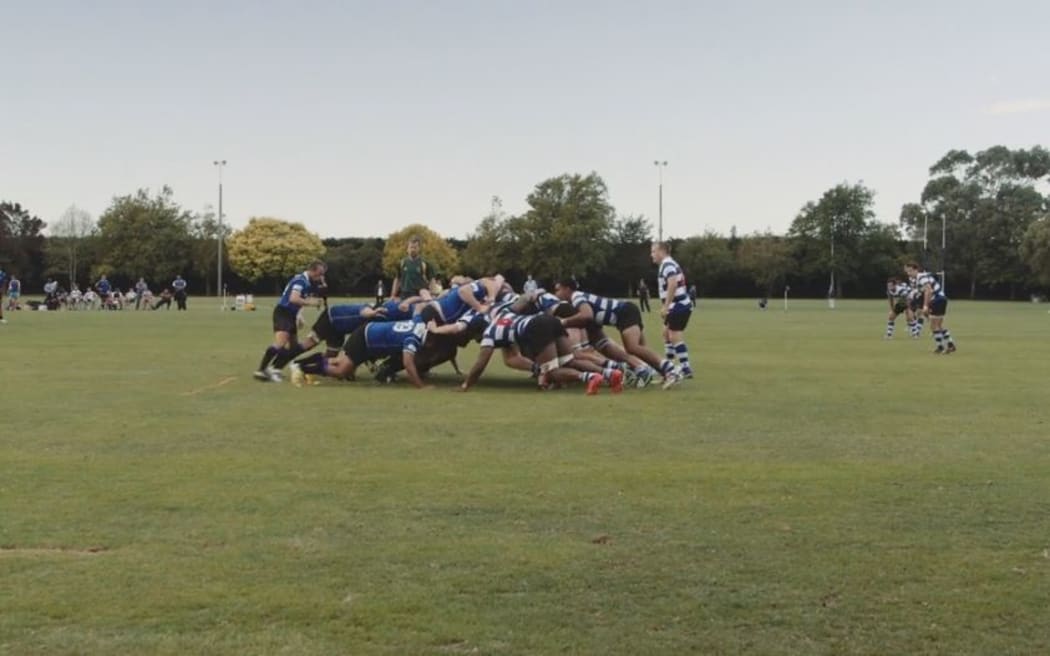As thousands of rugby players get set to lace up their boots ahead of game day on Saturday, one player's decision to hang his up is being hailed as a move against accepting concussion as just part of the sport.

Photo: RNZ / Julian Vares
Former Chiefs' prop Ben Afeaki's career was cut short after a severe concussion from a head clash with team mate Brodie Retallick in a Super Rugby match in February 2014.
After more than a year of being plagued with headaches, nausea and moodiness, his hopes of a return to the game are at an end. Afeaki announced his retirement yesterday.
He is by no means the first to bow out after a bad knock. Afeaki has spoken to other New Zealand players whose careers were cut short.
"I've spoken to Tom Chamberlain and Shane Cleaver. They've both had similar problems and are no longer playing rugby. They're the same, after making the decision a lot of the pressure was relieved off them," Afeaki said.
"I think once you make the decision and get it out there then you can feel comfortable with it and comfortable that you've made the right decision to live a healthy life."
At a time when the sport of rugby is growing, it seems so too are the risks involved. Last year New Zealand Rugby reported another increase with the most registrations yet on record, topping 150,000 players.
General manager Neil Sorensen said an evolving game makes safety all the more important.
"The game at the professional level in particular is getting bigger, faster, and stronger. And what that does is put the onus back on us to make sure that we keep up by ensuring that we make the game as safe as possible."
Serious harm - ambulance staff

Photo: RNZ / Diego Opatowski
And it's not hard to see why. St John Ambulance paramedic Steve Walker said concussions can have serious consequences.
"Ambulance staff right throughout New Zealand and the world will have seen people killed from single clashes of the head, people spending many days unconscious, requiring significant medical support to protect their airway and their wellbeing.
"We see a whole range, some of them are very minor but I've said it before and I'll say it again, that the cumulative head knock - they don't get any better, they get worse and worse as they go on."
Rugby-related head injuries reported to the Accident Compensation Corporation (ACC) are on the rise, up from 1,480 in 2010 to 2,212 last year, with costs up over half a million dollars - from $1,069,544 to $1,620,933.
Mr Sorensen said the rise was an indication that players were acknowledging the issue.
"We think it's actually a good thing because we expect that with the raised level of awareness, and we should celebrate that - when people put their hands up and say 'look, I don't think I'm 100 percent'," he said.
"I think the key thing is for us to keep being open about this and we believe the message is slowly getting through. It's no longer acceptable ... maybe 10-20 years ago you were seen as a bit of a hero for carrying on playing, the macho image - I'm going to get up and carry on.
"We believe there's no need in today's society and we don't want any part of that in our sport."
Identifying how to prevent this type of injury has become a focus for New Zealand Rugby.
"Part of it is us educating ourselves and then turning around and educating our players, coaches, physios and doctors," Mr Sorensen said.
"We won't shy away from the fact that our sport is a contact sport and there will be accidents. The key thing is to ensure that our players and our coaches in particular, and also our support staff, understand how injuries occur and they can teach the right technique.
Rugby Smart programme
"For example, any coach who is coaching kids over the age of 13 must go through what we call our Rugby Smart programme, which has been developed over the years with ACC, and that programme essentially is all about trying to reduce injuries through proper technique."
The programme has been picked up by Australian and South African rugby organisations.
The Chief Executive of the Rugby Players Association, Rob Nichol, said new initiatives and a focus on concussion over the last five or so years had led to a change in rugby's traditional macho culture.
"We had a period of time there where it was about being the tough guy, and not necessarily sharing your symptoms or signs of suspected concussion or potential concussion"
But he said everyone involved had matured in the past four or five years and people were much more aware of the potential consequences.
Mr Nichol said Afeaki's decision had drawn the issue back into the spotlight.
"Someone like Ben who is so well respected and liked amongst his fellow players, they will be looking at this and they will be thinking great guy, courageous decision, he was upfront right from the start.
"He's set a really good example for young players coming through."
Rugby culture has changed
A former rugby player who stopped playing because of recurring concussions said the sport did not have the soldier-on mentality towards head injuries that it used to.
Andrew Smith quit his university team in England after suffering three concussions in three months.
He said over recent years the "push through the pain" mentality has waned.
"Five, six, seven years ago you would just brush it off. It was... part of proving yourself as a player. You keep playing through these things," he said.
"I do think the perception is different now. I think player and official education is a lot better."
Another former player, Michael Barnes, had to stop playing after suffering about 15 concussions in the early 2000s. He now coached at the Old Boys University club in Wellington.
He agreed the sport had taken big steps in dealing with concussions, largely due to more education.
"When I first started getting concussions there wasn't a whole lot around about it," he said.
"Now there's more support for people in coaching and management roles, or referees, around what to look for."

